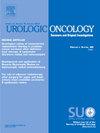Prostate-specific antigen screening among transgender women in clinical care: A retrospective chart review study
IF 2.3
3区 医学
Q3 ONCOLOGY
Urologic Oncology-seminars and Original Investigations
Pub Date : 2025-08-14
DOI:10.1016/j.urolonc.2025.07.017
引用次数: 0
Abstract
Background
Prostate-specific antigen (PSA) screening is controversial due to over-detection and treatment of low-grade prostate cancer. Consequently, the Canadian Urological Association (CUA) and the Canadian Task Force on Preventive Health Care (CTFPHC) differ with respect to recommending for versus recommending against PSA screening. Regardless, Canadian and global guidelines recommending PSA screening fail to address transgender (trans) women/transfeminine persons, though studies suggest this population remains at risk of prostate cancer, particularly those who have not accessed gender-affirming hormone therapy (GAHT) or gender-affirming surgeries. The objectives of this study were to: (1) characterize the prevalence of trans women/transfeminine persons aged 50+ who have ever received PSA screening and (2) explore sociodemographic, clinical, and social/structural factors associated with ever receiving PSA screening.
Methods
Drawing on a sub-sample of retrospective chart review data from trans women/ transfeminine persons aged 50+ across 6 family medicine and/or HIV clinics in Montreal and Toronto, Canada, 2018 to 2019 (excluding 1 endocrinology-only clinic), we assessed the prevalence of having received PSA screening (ever vs. never). Then, we compared ever having received PSA screening across sociodemographic (e.g., age), clinical (e.g., feminizing hormone therapy use), and social/structural factors (e.g., employment) using bivariable and multivariable binary logistic regression analyses.
Results
Among trans women/transfeminine persons aged 50+ (n = 213), 23.0% had ever received PSA screening (95% CI: 17.5%–29.3%). Applying logistic regression, being HIV positive (compared to being HIV negative) was statistically significantly associated with ever having received PSA screening in both bivariable (OR: 3.0, 95% CI: 1.10, 8.19, P < 0.05) and multivariable analyses controlling for age (OR: 3.61, 95% CI: 1.28, 10.19, P < 0.05). Compared to not having had vaginoplasty and controlling for age, having had vaginoplasty trended towards lower odds of ever having received PSA screening (OR: 0.43, 95% CI: 0.17, 1.06, P = 0.066).
Conclusions
Findings suggest that most trans women/transfeminine persons aged 50+ in our sample had never received PSA screening. Future studies could explore trans women/transfeminine person patient-provider decision-making with respect to PSA screening. Findings reinforce the need for continued discussion of trans women/transfeminine persons’ risk of prostate cancer, particularly given inconclusive research evidence to suggest otherwise for those not taking GAHT and call for clarity in PSA screening guidelines for this population to promote health equity.
临床护理中跨性别女性前列腺特异性抗原筛查:一项回顾性图表回顾研究。
背景:由于低级别前列腺癌的过度检测和治疗,前列腺特异性抗原(PSA)筛查存在争议。因此,加拿大泌尿协会(CUA)和加拿大预防保健工作组(CTFPHC)在推荐PSA筛查和不推荐PSA筛查方面存在分歧。无论如何,加拿大和全球推荐PSA筛查的指南并没有针对跨性别(跨性别)女性/跨性别者,尽管研究表明这一人群仍然有患前列腺癌的风险,特别是那些没有接受过性别确认激素治疗(GAHT)或性别确认手术的人。本研究的目的是:(1)描述50岁以上接受过PSA筛查的跨性别女性/跨性别者的患病率;(2)探索与接受过PSA筛查相关的社会人口学、临床和社会/结构因素。方法:从2018年至2019年加拿大蒙特利尔和多伦多6家家庭医学和/或艾滋病毒诊所(不包括1家内分泌科诊所)的50岁以上跨性别女性/跨性别者的回顾性图表回顾数据的子样本中,我们评估了接受PSA筛查的流行程度(曾经与从未)。然后,我们使用双变量和多变量二元逻辑回归分析比较了曾经接受过PSA筛查的社会人口学(例如,年龄)、临床(例如,女性化激素治疗的使用)和社会/结构因素(例如,就业)。结果:在50岁以上的跨性别女性/跨性别者中(n= 213), 23.0%曾接受过PSA筛查(95% CI: 17.5%-29.3%)。应用逻辑回归,在双变量分析(OR: 3.0, 95% CI: 1.10, 8.19, P< 0.05)和控制年龄的多变量分析(OR: 3.61, 95% CI: 1.28, 10.19, P< 0.05)中,HIV阳性(与HIV阴性相比)与曾经接受过PSA筛查有统计学显著相关。与未做过阴道成形术的患者相比,在控制年龄的情况下,做过阴道成形术的患者接受PSA筛查的几率更低(OR: 0.43, 95% CI: 0.17, 1.06, P= 0.066)。结论:研究结果表明,在我们的样本中,大多数50岁以上的跨性别女性/跨性别者从未接受过PSA筛查。未来的研究可以探讨跨性别女性/跨性别者在PSA筛查方面的患者-提供者决策。研究结果强调有必要继续讨论跨性别女性/跨性别者患前列腺癌的风险,特别是考虑到不确定的研究证据表明,对于那些不接受GAHT的人,情况并非如此,并呼吁明确针对这一人群的PSA筛查指南,以促进健康公平。
本文章由计算机程序翻译,如有差异,请以英文原文为准。
求助全文
约1分钟内获得全文
求助全文
来源期刊
CiteScore
4.80
自引率
3.70%
发文量
297
审稿时长
7.6 weeks
期刊介绍:
Urologic Oncology: Seminars and Original Investigations is the official journal of the Society of Urologic Oncology. The journal publishes practical, timely, and relevant clinical and basic science research articles which address any aspect of urologic oncology. Each issue comprises original research, news and topics, survey articles providing short commentaries on other important articles in the urologic oncology literature, and reviews including an in-depth Seminar examining a specific clinical dilemma. The journal periodically publishes supplement issues devoted to areas of current interest to the urologic oncology community. Articles published are of interest to researchers and the clinicians involved in the practice of urologic oncology including urologists, oncologists, and radiologists.

 求助内容:
求助内容: 应助结果提醒方式:
应助结果提醒方式:


